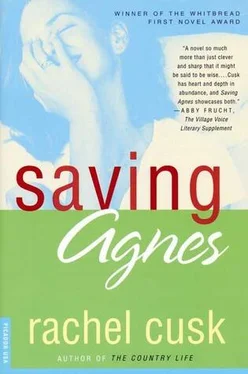‘Nothing that a good screw wouldn’t cure, is that it?’
Agnes herself was impressed by the fluent delivery of this masterful stroke. She wished Nina could have been there to witness it. Tom, being a staunch defender of family values, visibly blanched at the slight to his sister, before realising that she herself had delivered it.
‘That’s about the measure of it,’ he said. ‘If you could ever hang on to a man long enough for him to give you one.’
With this he began walking back to the house, perhaps realising that his descent into the realm of the personal would in all probability render certain of his own regions vulnerable to attack.
‘Talking about brains,’ Agnes yelled after him. ‘Whatever happened to yours? Do you think we should send out a search party?’
The next day, they drove back to London in silence.
‘What would you like to eat most in the whole world?’ said Agnes.
She and John were starving in India, and Agnes was torturing them both with her imagination. The fan above their bed turned slowly, stirring a soup of hot air and flies.
John leaned over and kissed her warm and fragile neck.
‘You,’ he said.
GRETA’S mother called the office every week long-distance from a remote farm in Saskatchewan, where, Agnes imagined, large crows perched on telegraph wires which looped crazily over lonely acres of prairie. Greta would talk to her for what seemed like hours, murmuring inaudibly into a receiver already insulated by her cupped hand, as if her mother were a spy or a secret lover. One day, however, the call came when Greta was out of the office for the afternoon; and Agnes took it with a prurience provoked as much by this suggestion of mystery as by the aspect of miracle she had formerly noted.
‘I want to speak to Greta Sankowitz,’ enunciated a woman’s voice carefully over a sudden static squall.
‘She’s not in the office at the moment, I’m afraid,’ replied Agnes. As her mind traversed the vast distances over which they were conversing, she wondered if she should take this opportunity to make one or two observances in the spirit of human commerce; ask about the weather in Saskatchewan or life on the farm, for example, in exchange for news of Finchley Central.
‘Excuse me?’ said the voice after a pause.
‘Yes, I’m still here.’
‘Who is this speaking?’
The woman sounded frightened. She spoke slowly, as if mistrustful of foreigners or telephones. Agnes felt guilty that she should be contributing to anyone’s feelings of technological alienation, and decided to clarify the situation.
‘My name’s Agnes,’ she said. ‘I’m a friend of Greta’s. We work together, actually. Greta won’t be back until tomorrow, but I’ll tell her then that you called.’
There was another pause. Waves of static crashed against the receiver and Agnes wondered if the woman had been cut off. She had an image of Mrs Sankowitz, tumescent and clutching a shopping basket, orbiting untethered in hyperspace like a giant loosed zeppelin. After a minute or two the woman spoke again. She sounded almost catatonic with terror.
‘Yes? I’m trying to speak to Greta Sankowitz.’
When Agnes related this occurrence to Greta the next morning, embarrassment at the memory led her to embellish her narrative with hazardous technological incidents, as if Greta should be protected from the knowledge that two people so closely connected to her had completely failed to communicate with each other in her absence.
‘It was a terrible line,’ she said generously. ‘She sounded so far away.’
‘Oh, she always sounds like that,’ said Greta.
‘Don’t you miss your family?’ Agnes inquired.
‘Sure.’
‘What are they like?’
‘Oh, pretty normal, I guess. My mom is really cool. She’s had it kind of rough. My dad’s a son of a bitch.’
‘What about your siblings?’ said Agnes, swerving away from a head-on collision with unpleasantness.
‘My what?’
‘Your brothers and sisters.’
‘Oh, yeah. You really want to know about all this?’
Agnes nodded.
‘Well, there’s my brother Clary, he’s in the army. He’s kind of a fascist enforcer type. I guess he takes after my dad. Then — let’s see — then there’s my sister Joanne, she married this real sleaze called Douglas. They moved to Ohio. Then there’s Lynette — she’s divorced and now she sings in this nightclub in Montreal. She’s really neat. Then there’s my sister Samantha, she married this guy called Steve. They’re cute but sort of weird.’
‘What do you mean?’
‘Well.’ Greta rolled her eyes. ‘Samantha — she’s my sister — she used to be really pretty, okay? She was the best out of all of us, really. Anyway, Steve lived in our town and he was the best-looking guy. So the two of them start dating, and when they were eighteen they got married. So, all is well. Anyway, they bought this farm and everything was fine until they started getting fat.’
‘Both of them?’
‘Yeah, that was the thing. These two gorgeous people. At first everyone just said, well, they’re in love, they’re happy — you know, some folks like to live a little round the middle when they settle down. But it kept happening, a bit more and a bit more. I guess they both just love to eat. After a couple of years they looked like a pair of giant slugs.’
‘But that’s awful!’ said Agnes, aghast. ‘What happened to them?’
‘Nothing.’ Greta shrugged. ‘They’re real happy together. They just got fat, I guess. What about yours, anyway?’
‘My family?’
‘Yeah. No, your frilly drawers.’ Greta grinned. ‘Dumbo.’
There was a time somewhere in the past when her parents had stopped being parents and she and Tom had ceased to be children. While it was hard to say which metamorphosis had precipitated which, or indeed if they were merely coincidental, it was still harder to locate the moment when the change had actually taken place, for there was within it no aspect of violent severance. It was more of a reversal of roles than a disassociation from them. There had been a time when Agnes’s parents were in charge, and they had worried, commanded, and spoken in hushed tones accordingly. Now their mystery was somehow no longer intact. Now Agnes and Tom worried and advised, and even, occasionally, criticised their parents’ behaviour.
While unable exactly to date this turn of events, Agnes aligned it in her mind with the period when, in some way she was never able to define but which she recalled with ineffable sadness, things had, for want of a better explanation, ceased to be real to her. Unlike the murky exchanges of adulthood, this moment — and it happened, literally, in a moment, nothing more — still retained a clarity which allowed its details to be summoned up at any time.
She had been walking down a street in the provincial town where her convent school lodged like a malignant tumour, passing the hour of parole before study by wandering, in the company of two or three other uniformed girls, along the shop-fronted pavements in the hope of glimpsing within these bright glass-plated spheres the promise of a future as yet unimaginable, though undoubtedly seductive. Normally on these excursions they purchased nothing that could so effectively liberate them from their imprisonment, but rather things that confirmed it: coloured pencils, ink-pens with flowered cases, logo-bearing rubbers; things which put a fatal insignia of identity on the nightmare of school, and which suggested it was not just a fleeting and horrible dream. She had, at the moment in question, been neither happy nor particularly unhappy. It was a grey afternoon in March, still light beneath a low cloudy sky. She walked beside a girl called Christine Poole, while the other two walked behind. She didn’t know what it was they were talking about, although the fact that they must have been talking impressed her now as amazing; even then, at the age of thirteen, when she knew so little about the world, she had been pronouncing and articulating.
Читать дальше












